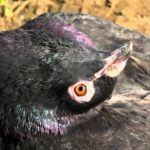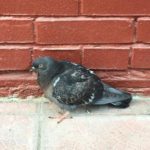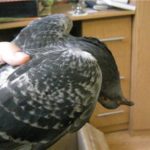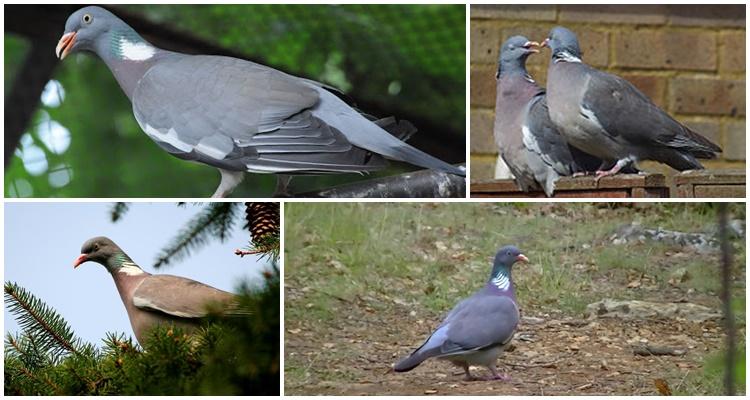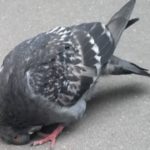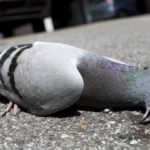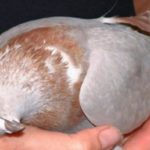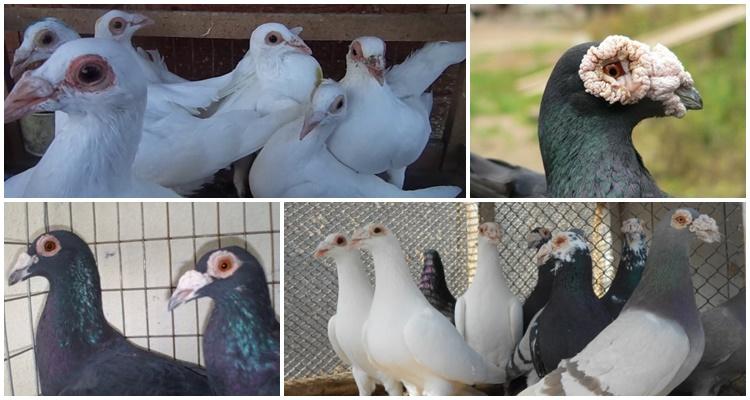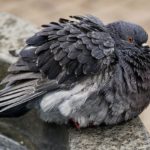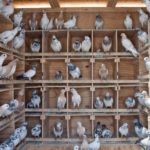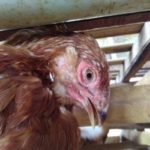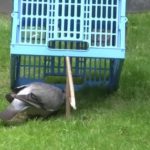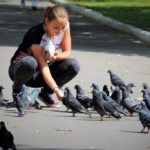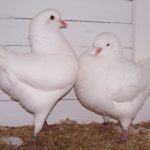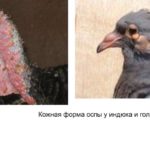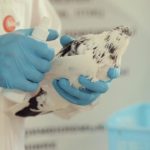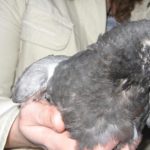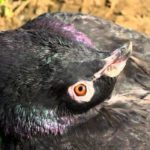Whirling disease, or Newcastle disease, occurs in pigeons at lightning speed (asymptomatic) or with pronounced clinical signs. This dangerous disease, also called Asian plague, often leads to the death of the entire population of birds. You can prevent whirligig through vaccination. Immunization is the only way to protect pigeons from this deadly avian disease.
Causes of whirligig in pigeons
Newcastle disease is caused by an RNA virus of the paramyxovirus genus.The pathogen is sensitive to ultraviolet radiation, and a temperature of +100 degrees Celsius kills it in one minute. The virus survives for years at sub-zero temperatures and in frozen bird carcasses. The pathogen can be found in soil, dirty litter, or on tools. You can disinfect the area and objects using alcohol, caustic soda, phenol, formaldehyde.
The virus affects adult pigeons and small chicks. Birds can become infected with this disease from sick residents of the poultry yard, as well as through contaminated feed, water, bedding, soil, feathers, eggs, and equipment. Newcastle disease also spreads aerogenously. Infection with whirlwind occurs through the respiratory system, mucous membranes of the eyes, mouth, and gastrointestinal tract (orally).
Newcastle disease is most severely affected by adults with weakened immunity due to poor nutrition and chickens.
Symptoms of the disease
Signs and characteristic features of the whirligig:
- the incubation period is 2-7 (less often 9-21) days;
- whirlwind develops lightning fast, acute, subacute or chronic;
- during lightning-fast flows, pigeons suddenly die without visible causes or symptoms;
- Acute pathology is characterized by fever, depression, inactivity, loss of appetite, clouding of the cornea, mucus from the mouth and nose, coughing, sneezing, difficulty breathing;
- developing in the digestive system, the virus causes watery diarrhea;
- with the slow development of the disease and damage to the nervous system, signs of encephalomyelitis are noticeable (uncertain walking, paralysis of the limbs or wings, tremors, convulsions, torticollis with neck rotation up to 180 degrees);
- whirligig can occur with symptoms of pneumonia, digestive and nervous disorders, or only with one type of clinical signs;
- with fulminant disease, death occurs within several hours;
- in acute cases of whirlwind, pigeons may die on the 4th day;
- in the subacute phase there are smoothed symptoms and a low percentage of death (about 30%);
- autopsy of dead, diseased birds reveals multiple pinpoint hemorrhagic lesions of internal organs;
- a chronic phase is possible, which does not lead to death, but causes irreversible nervous disorders (inability to fly).
Methods for diagnosing the disease
Vertyachka is diagnosed based on clinical signs and laboratory tests. During an epidemic outbreak, a dead bird carcass must be provided to the laboratory. As a result of pathological and laboratory studies, the virus that caused the disease in pigeons is isolated and identified. If Newcastle disease is confirmed, treatment is prescribed to living sick birds.
How to treat pigeon worm
Newcastle disease can be treated in its early stages. Sick pigeons must be quarantined (transplanted to a separate room). In advanced cases, treatment is not advisable. It is recommended to dispose of birds that have been diagnosed with a severe course of the disease.
Drugs
Wriggle is treated with medications that can be purchased at any veterinary pharmacy. If signs of Newcastle disease are detected, the pigeons are prescribed Fosprenil. This is a medicine with antiviral and immunomodulatory properties. The drug activates the production of interferon in the body of birds, which begins to fight viruses.
The oral medicine can be added to drinking water or dropped into the pigeon's mouth. This drug is available as an injection solution (injections into the chest).The duration of taking the medicine is 5-10 days.
Together with Fosprenil, sick birds are prescribed Piracetam or Cerebrolysin. These medications support the nervous system of pigeons. In parallel with these two drugs, the birds are given pharmaceutical vitamins and minerals (“Gamavit”). In some cases, Karsil is prescribed to maintain liver function. In case of infectious infection, an antibiotic is prescribed, and then probiotics. The dosage of any medications must be prescribed by a veterinarian.
Folk remedies and recipes
Pigeon worm is not a new disease. The virus existed long before the advent of pharmaceutical drugs that are currently used to combat the pathogen and treat birds. Among the people, vertigo is treated with improvised means.
It is recommended that sick pigeons be given a slightly pink solution of potassium permanganate to drink. To replenish the body with vitamins, birds add chopped spruce needles, onions and garlic to their feed. Sick individuals can be given a decoction of chamomile, St. John's wort, and nettle. Some pigeon breeders treat whirligig with olive oil and lemon juice; sick pigeons are given this mixture.
Danger to humans
People who come into contact with sick birds (pigeon breeders, veterinarians, laboratory assistants) can get sick with pigeon worm. Sometimes a person develops signs of conjunctivitis and a cold. The virus enters the human body through the respiratory system, mouth, and mucous membranes of the eyes.Possible deterioration in health, runny nose, cough, enlarged parotid lymph nodes.
True, human infection with Newcastle disease occurs in isolated cases. Only people with weak immunity and a tendency to allergies suffer from susceptibility to this avian disease. Whirling is a disease of pigeons; in most cases, it is not dangerous for humans.
Preventive actions
The spread of whirlwind is easier to prevent than to treat. First of all, it is recommended to protect domestic pigeons from contact with birds of prey that carry the virus. In the dovecote, it is necessary to regularly clean and disinfect the premises. It is advisable to vaccinate healthy pigeons. Immunization increases the resistance of birds to the virus. Vaccination will save pigeons life.
Several types of live vaccines against Newcastle disease have been developed. It is recommended to vaccinate birds twice. Adult pigeons are vaccinated before hatching eggs (in early spring) and in the fall, before molting. Birds become immune to the virus 48-96 hours after vaccination.
Vaccination is carried out in different ways: by instillation, aerosol injection, drinking, intramuscular injection. A small percentage of vaccinated pigeons do not develop antibodies to the virus. Vaccinations are given only to healthy birds. If signs of whirligig are detected in pigeons, the entire poultry farm is quarantined (for 40 days).

